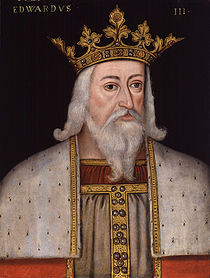|
The visit
of
Edward
III
|
 |
The earliest
recorded
royal visit to Bourne is that of Edward III who reigned from
1327 to 1377, although this is most unlikely to have occurred. He was the eldest
son of Edward II and Isabella of France and was born at Windsor Castle,
succeeding to the throne at the age of four although a council was elected
to govern during his minority with his mother's lover, Roger Mortimer, the
principal power in the state. He was seized and executed in 1330 and
Isabella forced to retire from public life when Edward finally took
supreme power.
It has been claimed that the visit was the result of an invitation from
Thomas Wake (1297-1349), a descendant of Hugh Wake who had become Lord of
the Manor of Bourne in 1166. Thomas was a baron who played a significant
part in the political affairs of his time but the evidence is that he was an absentee landlord who never
actually lived here. He had been only three years old when he succeeded his father
as Lord of the Manor and for some
years was a royal ward although the king, Edward II eventually allowed him
full possession of his lands when he reached the age of twenty and these
included large estates in Lincolnshire and Rutland.
He married Blanche, daughter of Henry of Lancaster and great grand
daughter of Henry III and became constable of the Tower of London with
responsibility for political prisoners and the peace and defence of the
city.
The story goes that in 1330, Thomas Wake invited Edward III to be his
guest at Bourne Castle but this is doubtful and the reasons why are well
described by J D Birkbeck in his book A History of Bourne, (1976):
"Thomas Wake was one of the barons who
opposed the Despensers, the favourites of Edward II, and joined with Queen
Isabella and Mortimer against the king. When the Despensers were captured
in 1326, Wake was one of the judges who sentenced them to death. After the
death of the king himself in 1327, Wake became increasingly hostile
towards his earlier patrons, Isabella and Mortimer. He was now constable
of the Tower of London, having charge of the political prisoners therein,
and also having responsibility for the peace and defence of the city.
"In
1328, he joined a rising against Isabella and Mortimer but after Mortimer
had seized Leicester and confronted his enemies with great force, Thomas
Wake was obliged to surrender and was then fined and deprived of his
offices. In 1331, after the fall and death of Mortimer, he was restored to
his lands and offices. He was also, for a time, governor of the Channel
Islands. It appears that he did not always find favour with the new king,
Edward III, for he was imprisoned in 1340.
"For the remainder of his life, he seems to have figured less prominently
in national affairs but it is clear that he was a man of power and
influence in his day. It is hardly likely that he would spend much time at
his manor of Bourne but there is a tradition that on one occasion he
received a very eminent visitor at Bourne Castle, Edward III, who was
his guest in the spring of 1330.
"However, it is difficult to reconcile this date with the fact that Wake
was in disfavour with Isabella and Mortimer after 1329 and was not
restored to his lands and offices until 1331. Though the young king Edward
III was certainly antagonistic to his mother and Mortimer, would Thomas
Wake be able to receive him at Bourne in 1330 or had he not been deprived
of his Bourne estate?"
NOTE: I am indebted to J D Birkbeck for
his permission to quote from A History of
Bourne. Picture of Edward III by an unknown artist from the National
Portrait
Gallery reproduced from the Wikipedia web site.

Go to:
Main Index Villages
Index
|
